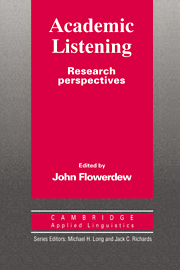Book contents
III - DISCOURSE OF ACADEMIC LECTURES
Published online by Cambridge University Press: 05 October 2012
Summary
Editor's introduction to Part III
Discourse analysis is the research methodology which has probably been most applied in relation to L2 lecture comprehension (see the background chapter by Flowerdew to this collection). Discourse analysis of lectures is important because knowledge concerning the macro- and micro-structuring of lectures will, on the one hand, allow content lecturers to structure their lectures in an optimal fashion (a number of contributors to this volume have noted how content lecturers have found analysis of their lectures useful (Tauroza and Allison, Dudley-Evans); on the other hand, it will aid ESL materials designers to produce instructional materials which familiarize learners with the form of authentic lectures.
This section of the book makes a further contribution in the area of discourse analysis of lectures, presenting three chapters which analyze lecture discourse from different perspectives, and which show how the tools of discourse analysis can provide insights for pedagogy.
Hansen, in her chapter, presents a model of lecture discourse based on the notion of discourse topic. Combining two approaches to the notion of topic, that of sentential topic and that of topic framework, Hansen shows how a lecture can be broken down into its constituent parts, according to a hierarchy of major topics, subtopics and minor points. Hansen shows how the analysis of a lecture according to this method can be used as a measure of completeness and correctness of student notes.
- Type
- Chapter
- Information
- Academic ListeningResearch Perspectives, pp. 129 - 130Publisher: Cambridge University PressPrint publication year: 1995



